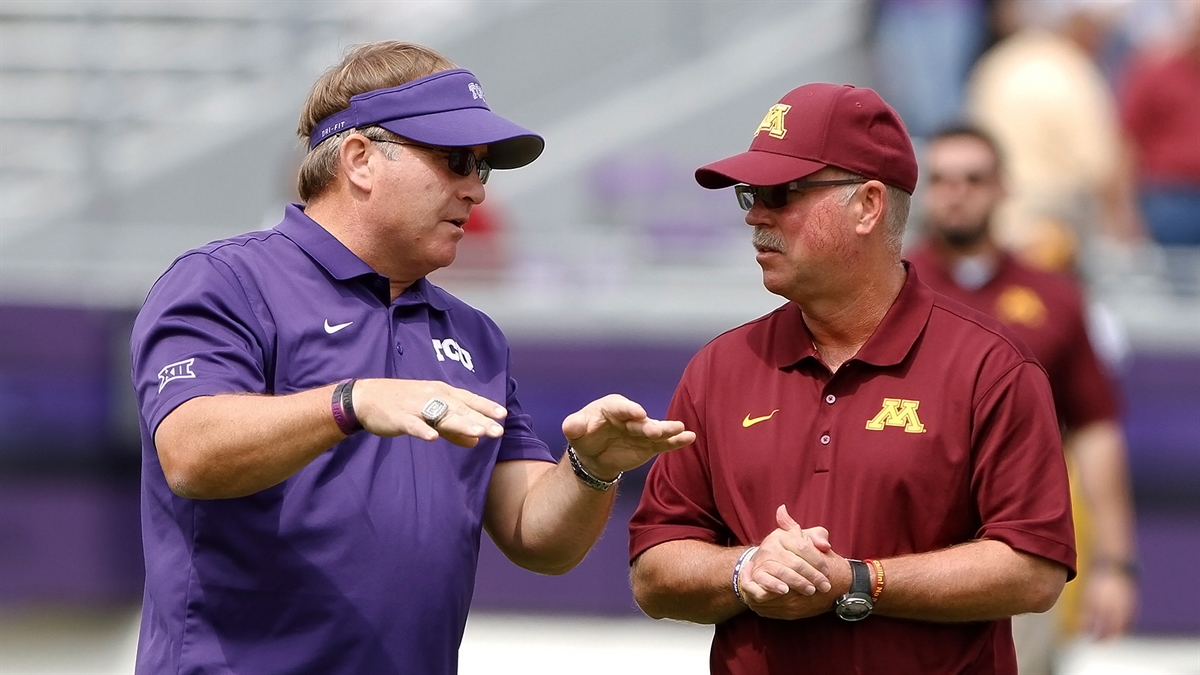Longtime college football head coach Jerry Kill joined TCU in an off-field role officially titled “special assistant to the head coach” in February. But if you ask Kill what exactly his role will be at TCU, it stretches much further than just a simple advisor.
TCU head coach Gary Patterson ranks among the top defensive gurus in America. To support him, Kill will take on a role that is being described as akin to a head coach of offense.
Since Kill is not one of the 10 official on-field assistant coaches, he cannot technically participate in on-field instruction of players. However, he will be involved in direction, schematics and evaluation of offensive coaches, along with evaluation of Patterson himself.
“I coach the coaches,” Kill said. “I watch the film with them, go over all the techniques, everything we’re doing. I can be there during game day, make recruiting suggestions. I can do anything off the field, and during practice, I can be on the field. You can coach a lot and not have to say anything.”
Kill and Patterson’s relationship goes back decades. Both are Kansas natives who played for Dennis Franchione – Patterson at Kansas State, Kill at Southwestern (Kan.) – and Kill even served as best man at Patterson’s wedding. Kill believes their close relationship gives him a unique ability to work with Patterson to fix TCU’s issues.
“We can talk in a different way because we go back so long,” Kill said. “There’s a deep amount of respect. I know him better than anyone in Fort Worth.”
TCU’s offense has regressed over the past several seasons. After ranking No. 3 in total offense in Trevone Boykin’s final season in 2015, the Horned Frogs have steadily declined. TCU fell to No. 45 during a run to the Big 12 title game in 2017, before falling off a cliff to No. 98 in 2018. The offense jumps to No. 62 in 2019, but still just No. 7 in the Big 12.
Uncoincidentally, TCU fell from 11-3 in 2017 to 5-7 in 2019, just the fourth losing season of the Patterson era. Kill noted that Patterson had to do more work coaching and focusing on offense the past two seasons than in previous seasons. The hope is Kill can shoulder some of that responsibility.
“I’m trying to take some things off his plate so he can do what he does best,” Kill said. “When we can take things off his plate, we can win games.”
Kill spent 21 years as a head coach at every level from Division-II to Power Five, and had a knack for getting the most out of underachieving programs. He helped set the stage for Northern Illinois’ resurgence in the late 2000s, and then took Minnesota to back-to-back eight-win seasons for the first time in a decade.
However, health issues pushed Kill out of head coaching in 2015. He’s spent the last few years going around the nation and working as a consultant for big-time programs, including Kansas State and Notre Dame. Kill spent the 2019 season helping TCU staff alum Justin Fuente rebuild his running game; the Hokies went 6-2 after his arrival.
Kill will be asked to stabilize an offensive coaching staff filled with moving pieces. Offensive coordinator Sonny Cumbie is entering his fourth season in the primary play calling role. Former offensive coordinator Doug Meacham, who spearheaded the offensive innovation that led to a Big 12 championship in 2014, is back on campus as inside receivers and tight ends coach. Co-offensive coordinator and running backs coach Curtis Luper is also gone, replaced by Bryan Applewhite.
Patterson was noncommittal about how this structure could work in practice during a media availability last week.
“I don’t know. We’ll see. Right now that’s for me to know and you to find out,” Patterson said last week. “We’d know a lot more about it if we had gone through more than four practices in the spring.
“Right now, it gave us an opportunity to really go back to the beginning instead of rushing things. This time in some ways has been very helpful for our offense to get to know each other and figure out what our strengths are.”
Kill made his top priority evaluating how to improve fundamentals across the roster, but especially on the offensive line. TCU only went through four spring practices before the COVID-19 pandemic shut everything down.
“According to Coach Patterson, that was the best four practices the offense has had in about five or six years,” Kill said. “So I think we’re on the right track.”
_____
Become a DCTF Insider today for exclusive insight from the best team of reporters in the Lone Star State! CLICK HERE!
Your subscription will include:
- Instant access to all of our content that is marked Insider at www.texasfootball.com.
- Includes exclusive podcasts, recruiting news, and our full High School Football rankings and score predictors
- A mailed copy of the Dave Campbell’s Texas Football Preview
- A mailed copy of the Recruiting/Rising Edition of Dave Campbell’s Texas Football
- Access to Dave Campbell’s Texas Football vast array of archived magazines
This article is available to our Digital Subscribers.
Click "Subscribe Now" to see a list of subscription offers.
Already a Subscriber? Sign In to access this content.


